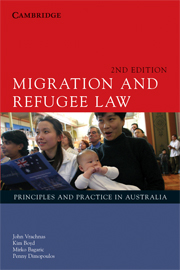Book contents
- Frontmatter
- Contents
- Table of cases
- Table of statutes
- Preface to the second edition
- Acknowledgments
- 1 Historical context to migration
- 2 Immigration control: an overview
- 3 Basic migration legislation and policy
- 4 The visa system and application procedures
- 5 Family and interdependency migration and other Australia-based visas
- 6 Business and investment visas
- 7 Skill-based visas
- 8 Temporary visas
- 9 Miscellaneous visas
- 10 Common visa requirements
- 11 Compliance: unlawful non-citizens, removal and deportation
- 12 History of the refugees convention and definitional framework
- 13 Refugee and humanitarian visas: the statutory structure
- 14 Convention grounds
- 15 Persecution
- 16 Well-founded fear of persecution
- 17 Limits on protection of refugees – cessation, exclusion exceptions and protection by another country
- 18 Time for a fundamental re-think: need as the criterion for assistance
- 19 The determination and review process for migration and refugee decisions
- Index
1 - Historical context to migration
Published online by Cambridge University Press: 05 June 2012
- Frontmatter
- Contents
- Table of cases
- Table of statutes
- Preface to the second edition
- Acknowledgments
- 1 Historical context to migration
- 2 Immigration control: an overview
- 3 Basic migration legislation and policy
- 4 The visa system and application procedures
- 5 Family and interdependency migration and other Australia-based visas
- 6 Business and investment visas
- 7 Skill-based visas
- 8 Temporary visas
- 9 Miscellaneous visas
- 10 Common visa requirements
- 11 Compliance: unlawful non-citizens, removal and deportation
- 12 History of the refugees convention and definitional framework
- 13 Refugee and humanitarian visas: the statutory structure
- 14 Convention grounds
- 15 Persecution
- 16 Well-founded fear of persecution
- 17 Limits on protection of refugees – cessation, exclusion exceptions and protection by another country
- 18 Time for a fundamental re-think: need as the criterion for assistance
- 19 The determination and review process for migration and refugee decisions
- Index
Summary
‘We will decide who comes to this country and the circumstances in which they come.’
Former Prime Minister John Howard, 28 October 2001, Liberal Party election launchIntroduction
It is not possible to understand the ongoing immigration debate and current immigration policy in Australia without some understanding of its genesis and development, particularly since white settlers first arrived in the late eighteenth century. Until late into the twentieth century, issues that are fundamental to human diversity, particularly race and colour, were overt policy considerations that found their way, one way or another, into Australian legislation. Innate factors of birth and others of conscience, such as religion or political opinion, continue to figure in debate about who is entitled to live in Australia. In recent times, the debate has centred on ‘boat people’ and most recently, in the wake of the September 11 Al-Qaeda attacks on the United States, the issue of religion has been an undercurrent in the focus on terrorism.
That immigration debate is never far from the surface. When former Prime Minister John Howard made the statement quoted at the head of this chapter, it was nothing new. Similar expressions have been made by members of the judiciary and politicians of all hues since before Federation.
When the Labor Party was in the throes of completing a largely bipartisan overhaul of the migration legislation in the late 1980s, the then-Immigration Minister, Senator Robert Ray, made a similar comment when he announced the Labor government's response to the Fitzgerald Report.
- Type
- Chapter
- Information
- Migration and Refugee LawPrinciples and Practice in Australia, pp. 1 - 15Publisher: Cambridge University PressPrint publication year: 2008
- 2
- Cited by



